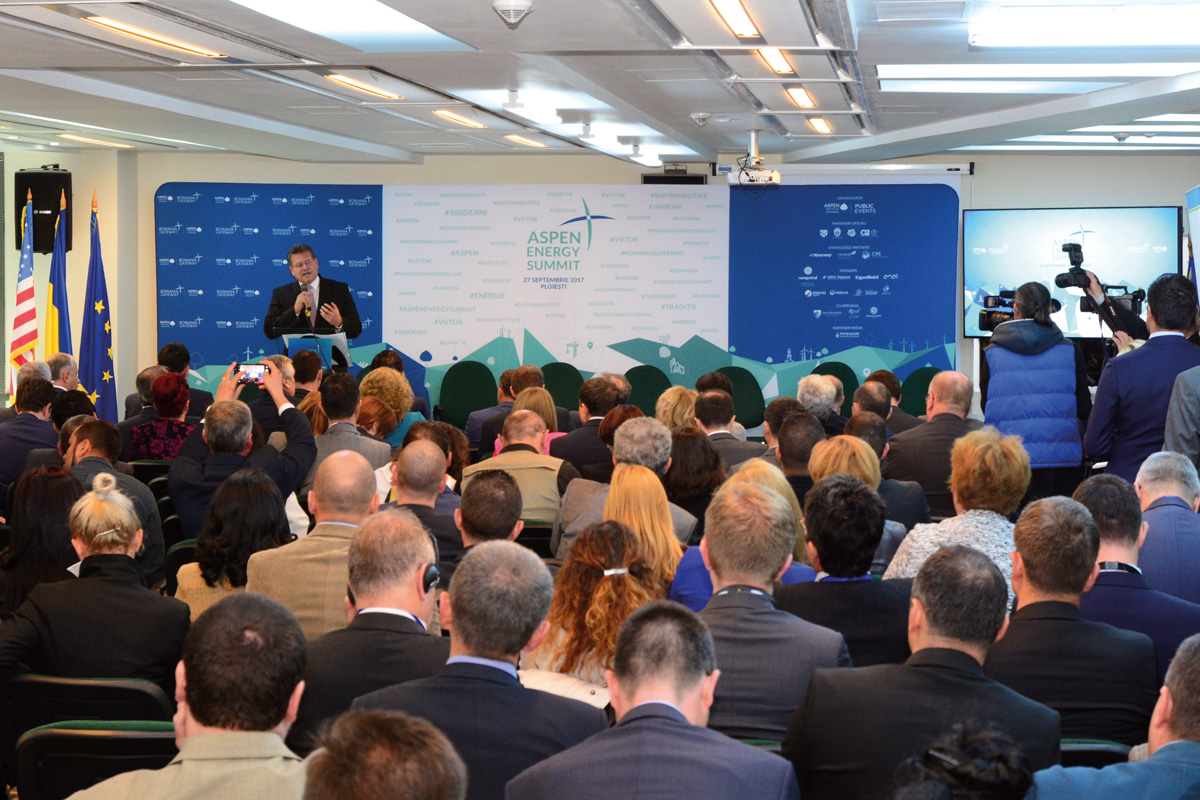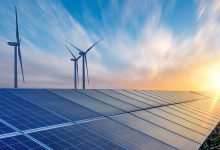ASPEN ENERGY SUMMIT: Celebrating a long tradition of the energy industry in Ploiesti
Aspen Institute Romania was privileged to partner with local authorities, business & institutional partners in celebrating a long tradition of the energy industry in Ploiesti, a tradition that started 160 years ago with the first oil refinery in the world and that celebrates PLOIESTI 2017 – WORLD CAPITAL OF OIL. The Aspen Energy Summit took place on the 27th of September in Ploiesti, Romania, discussions focused on: Romania’s role as a provider of energy security to the region, transnational cooperation with regard to the gas market – the BRUA (Bulgaria, Romania, Hungary, Austria) pipeline, Central and South-Eastern European Gas Connectivity (CESEC) extending cooperation on electricity, energy efficiency and renewable energy, and the geopolitical environment.
Romania’s Energy Outlook
The Aspen Energy Summit kicked off with a message from the Prime Minister of Romania, Mihai Tudose, that highlighted “The energy field is of maximum importance for the Romanian Government. The government looks carefully at the key trends and evolutions, in order to reach its objectives: increasing energy security & independence. Romania’s tradition and existing potential are binding us to achieve energy independence and become suppliers of energy security in the region.” With this in mind, the Romanian government has accelerated the efforts of finalizing the National Energy Strategy, which will also include a list of essential projects such as the (i) Reactors 3 & 4 from the Cernavoda Nuclear plant, (ii) the Tarnita Hydropower, (iii) the development of new capacities at the Oltenia Energy Complex, (iv) the BRUA project.
The Romanian Government has reconfirmed its commitment towards completing the BRUA project, as a priority for Romania’s gas sector. The completion of the BRUA pipeline represents an opportunity for Romania to capitalize on the discoveries in the Black Sea (Black Sea Oil & Gas, Romanian company, controlled by private equity firm Carlyle Group, said it aims to start production of the two wells holding an estimated 10 bcm by 2019), that would later help the country become a regional energy hub, a gateway for Europe. In this regard developing the transport routes and interconnections with neighbouring countries is part of the Romania’s energy infrastructure principles for development.
Ploiesti 2017 – World Capital of Oil
Zooming in, from the national outlook to a local perspective, highlights why Ploiesti & the Prahova county represent one of main engines when we’re talking about the Romanian energy sector and the importance of such a place in achieving the national agenda. According to Mr. Bogdan Toader, President of the Prahova County Council, the tradition of Ploiesti and the Prahova county in the energy sector goes beyond the opening of the first oil refinery in the world, it also holds milestones such as the first school for foreman drillers in the world, the first institute for petroleum research and development in Europe and the only Oil and Gas Institute in South Eastern Europe, making Ploiesti the proud host of the title World Capital of Oil in 2017.
“The oil & gas industry is sure to continue to be the economic engine of the city of Ploiesti, the tradition & know-how, skilled workforce, vibrant business environment makes the city a key hotspot for investments.” – Adrian Dobre, Mayor of Ploiesti.
The importance of the energy sector in the economic development of the city was backed by the numbers presented by Mr. Aurelian Gogulescu, President of the Chamber of Industry and Commerce Prahova. Out of a total of 21.800 companies in the county of Prahova, about 730 companies operate in the oil and gas industry, more than 14.000 employees work in the industry and about 31% of Prahova County’s GDP is in the Petroleum industry.
The growth of the energy sector is dependent on the skilled labour force, the Petroleum-Gas University in Ploiesti (UPG) is responsible for 6.000 students annually, preparing specialists the energy sector needs in the future. To achieve this, the university invests in local and international partnerships according to PhD. Eng. Mihail Minescu, Pro-rector, UPG. Working partnerships between UPG and companies like Engie or Enel allows for a cooperation between the public and private sectors that enables better training of the future workforce. UPG has active partnerships with universities from the US (Oklahoma), Azerbaijan or China.
Regional Energy Market – Increasing Efficiency, Interconnections & Security
The recent geopolitical context continues to raise the question of a multi-speed Europe, a Europe with different agendas between the core and the periphery. Romania and the rest of the countries in the region need to come together and find appropriate mechanisms to cooperate on issues such as energy security. This year the inter-governmental framework CESEC is extending its scope from natural gas towards the power sector, promoting renewables and energy sufficiency, setting out projects of common interest with the goal of increasing energy security and meeting electricity demand on the medium and long term at affordable prices for consumers.
The EU’s Energy Union needs to find Romania a modern competitive market. In this regard, efforts in becoming a regional hub need to continue towards a predictability, stable, transparent functioning market. According to the chief of the National Energy Regulatory Agency, Niculae Havrilet (in office on September 27th – our note), the Romanian energy sector is already on track, having achieved several milestones that allows for a better functioning energy Romanian market:
- Romanian energy market has an approx. size of 20-25 bln. euro per year out of a national GDP of 180 bln. euro.
- Hidroelectrica & Nuclearelectrica managed to get from insolvency, 5 years ago, to a 1 bln. contribution to the state budget.
- From 2012, 100% of electrical power is freely traded on the national market.
- 2017 is the first year in which more than 50% of the national gas production is traded on the free market, the minimum quota was set at 35%.
- Completing the process of linking the market for the next day with Hungary, Czech Republic, Slovakia.
A number of practical achievements helped improve cooperation in South East Europe, an increasing number of initiatives coming out of the region (as opposed to a top down element from the EC), the process towards a single regulatory framework for the region, extending cooperation to electricity, cybersecurity and efficiency. One major challenges for projects in the region continues to be a dependency on public funds. According to Christian Egenhofer, Senior Research Fellow & Director, CEPS & CEPS Energy Climate House: “A shift of emphasis from the hardware dimension (interconnection, limited infrastructure projects, pipelines) towards the software (market functioning elements) has taken place.”
Keynote address: Maroš Šefčovič, Vice-president of the European Commission, responsible with the Energy Union
Within the EU, the world’s biggest market, Romania’s holds the assets that allow the country to become an energy player, completion of key infrastructure and production projects will allow Romania to export natural gas and play an important role in the region’s energy security.
Mr. Šefčovič stated that: “What is of crucial importance, what is the role Romania can play in improving the situation of Central Eastern and South-Eastern Europe? Because we know it from our empirical experience, but also through our results from impact assessments and vulnerability studies, that this is the region which is still the most vulnerable region in the EU when it comes to the energy security.”
From the last stress test, done in 2014, a lot of things have improved, there are more interconnectors and cross border flow, better sources of supply and a set of legislative measures that improve the situation, progress of LNG projects or the BRUA corridor agreement, but it is important to build upon these accomplishments and extend cooperation in the region.
It is important to reiterate that CESEC took a decision after the cancelation of the South Stream project that, in the future, it wouldn’t rely on a single big project, but would use cross-national projects to better interconnect the gas markets of the region and seek to improve resilience by having at least 3 sources of natural gas.
“The CESEC progress with regard to the gas sector brought us to build on the good cooperation, to bring the same energy and work together in the CESEC format on other areas such as energy efficiency, electricity interconnections and renewables and the overall transition to clean energy”. Romania’s progress in the coupling of the electricity market with the Czech Republic, Slovakia and Hungary, was greatly beneficial for all 4 countries. Continuing to develop interconnected competitive markets in this region that would improve the energy security in the region.
Increasing energy security lies also in improving energy efficiency. “For Europe, a 1% gain in energy efficiency means a decrease of about 2.6% of gas imports”. Energy efficiency and European funds allow for efficiency projects to be developed that help the vulnerable European costumers save money by reducing energy bills and tackle energy poverty. In this aspect, Romania allocated more than 1 bln. euro for energy efficiency projects from the Structural Funds. “We are undergoing the deepest transformation of the European energy sector, a transformation in which an unprecedented empowerment of the consumer is taking place.”
Romania is one of the few countries that achieved the EU’s 2020 target ahead of time and can furthermore use its good results in trading and helping other countries in reaching their goal. According to European experts the potential of Romania is of 740 GW, out of which 130 GW can be implemented very quickly and cost effectively.
In order to unleash Romania’s investment potential in such projects, the government should invest in creating an investment platform that aggregates the projects and works with the banking system in order to achieve innovative financing.
US Security Cooperation
Romania’s security collaboration extends regional and European partners, having a background of 20 years of strategic partnership with the USA, the country is encouraged by US officials to continue its commitment in becoming a regional energy player. US administration is a stanch supporter of European energy security, built upon the pillars of removing barriers to energy development and trade, promoting US energy trade (including technology, services and resources) and ensuring economic and energy security.
The United States encourages all partners and allies to seek energy security by minimizing dependency of oil and gas on a single supplier, true energy security can be achieved throughout the diversification of fuel types, supply sources and delivery routes. According to H.E. Hans Klemm, ambassador of the USA to Romania, “Nord Stream 2 & Turkish Stream undermine these efforts as it increases dependency on Russian gas, it enforces Russian dominance of the European gas market, reduces opportunities for the diversification of energy sources and advances Russians goals of undermining Ukraine by ending its role as a transit country.”
The construction of Nord Stream 2 would concentrate over 78% of Russian gas imports to the EU through a single route, creating a potential choke-point that would significantly increase Europe’s vulnerability to a supply disruption.
The US stands by Romania in the country’s effort to contribute to regional energy security by developing interconnectors with neighbouring countries, seeking different fuel types, as well as alternative routes and sources. Carla Elena Snyder, Energy Diplomacy Officer for Western Europe, Resource Office for Energy, US State Department stated: “Because of Romania’s geopolitical situation, long history in the energy sector, development and production and close ties to the US, Romania is a critical player in European energy security. Romania has made very important contributions such as the support for the connection with Moldova, the progress on BRUA and efforts for the interconnectors with Bulgaria and Hungary.”
The energy sector plays a key role in ensuring security and prosperity, both those of Romania and those of the US, the two countries will continue to foster cooperation, government to government as well as business to business.
Major takeaways from the 2017 Aspen Energy Summit included the following:
- Romania is committed to become an important player in the regional energy market, wanting to be a key provider of energy security for the region.
- In the context of regional market integration, the BRUA pipeline is essential for connecting the recently discovered resources in the Black Sea with CESEC markets. This is an essential step in transforming Romania into a regional energy hub.
- Romania’s energy focus is set on capitalization of the Black Sea resources, where an ongoing investment will focus on the 10 billion cubic meters of gas in the Black Sea. In order to fully capitalize the country needs the BRUA project operational.
- Diversification of sources and fuel types means that Romania is also focusing on LNG as potential alternatives, the AGRI LNG project is a viable alternative, but it should compete with other projects in the Caspian region.
- The EU and Romania’s sustained effort to connect to Moldova should continue, as the Moldovan officials continue their process of aligning to European standards. Officials from both sides making the point that feasibility is sometimes trumped by security and geopolitics.
- The US officials expressed concerns with regard to projects that undermine European energy security such as Nord Stream 2 and Turkish Stream, that would only increase dependency on the Russian gas, bypass transit through Ukraine corridor/pipelines, do not diversify.
- Ploiesti is a key engine of the Romanian energy sector, offering skilled workforce and technical expertise, a growing business environment that enables national and transnational investments.
The energy dimension is part of the Aspen Institute’s core policy programs, representing an active and prominent convener of non-partisan policy dialogue and neutral forums focused on key energy topics and ways of advancing environmental sustainability in a technological world. The Program promotes values-based dialogue between thought leaders from business, government, NGOs, and academia to address complex energy policy challenges in an atmosphere that allows deliberation, creativity and collaboration to flourish. Like the Aspen Institute as a whole, the energy programs seek to inspire and explore new ideas and provoke action in the real world.






